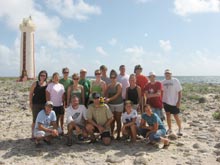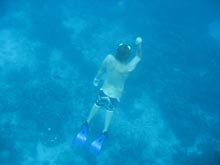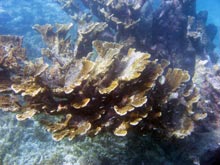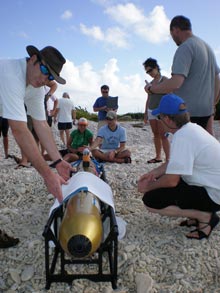University of Delaware's Caribbean Study Abroad Program
The University of Delaware Study Abroad group poses for a photo at the lighthouse on the south end of the island, during an educational tour of Bonaire. Click image for larger view and image credit.
One of the study abroad students, Nate Maier, free diving at a dive site on the south end of Bonaire. Click image for larger view and image credit.
January 20, 2008
Doug Miller
Associate Professor
College of Marine and Earth Studies
University of Delaware
Sixteen students, mostly upperclassmen pursuing degrees in biology, geology and environmental sciences, have come to Bonaire for the month of January to experience the tropical environment and to investigate the coral reefs and other marine communities accessible on this island. Each student takes seven credits in courses on carbonate geology, tropical field biology, and a research-based independent study.
Presentations by the directors (Art Trembanis and Doug Miller), guest lectures by members of the NOAA Bonaire 2008 project science team, and group excursions together form the academic core of the program. To demonstrate their knowledge and competence, students must post weekly blog entries ![]()
![]() ; pass practical exams by identifying marine flora, fauna and geologic features; create a naturalist’s notebook in a collaborative wiki-based format; and a complete unique “bathycaching” exercise using data from the science team.
; pass practical exams by identifying marine flora, fauna and geologic features; create a naturalist’s notebook in a collaborative wiki-based format; and a complete unique “bathycaching” exercise using data from the science team.
This class work facilitates a mini research project that is the capstone experience of the study abroad. Students must do background research, design and execute sampling, and analyze their data. In teams, the students have chosen some aspect of biology and geology they have discovered here. Several of the teams are sampling together to take full advantage of field sites and the access to them. The students’ research results will be presented in final project reports and presentations at the end of the month.
Students in this program get a double dose of science, both from their own projects and (just as importantly) from interactions with the NOAA Bonaire 2008 science team. Students assist in shore operations related to launch and recovery of the robots. Two of the students are certified research divers and work daily with the science team. Students have been tasked with interpreting side scan sea-floor maps from the robots and to snorkel or dive to locate, ground truth, and georeference visible features. Those students who choose sampling sites in conjunction with AUV operations may take advantage of their preliminary results in the form of geoacoustic data and digital images. In addition, students have opportunities to interact informally with science team members while touring the island and at dinners hosted at the science villa.
From our first days in Bonaire, it was apparent that both the NOAA Bonaire 2008 science team and the 16 University of Delaware students of the study abroad program benefit mutually and substantially from the interaction of the two groups. A science-oriented study abroad program is itself relatively unusual, and offering an immersive research experience in an intensive one-month timeframe is even more so. Coordination of activities, sharing of expertise and data, and collegiality with science team members greatly enhances both the academic and scientific dimension of this Bonaire study abroad experience.
Sign up for the Ocean Explorer E-mail Update List.






























